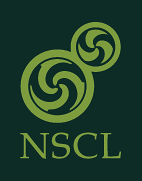Undergrads Receive Hantel Fellowship Awards
Three of the Lab's undergraduate students were chosen to receive the Department of Physics and Astronomy's Lawrence W. Hantel Endowed Fellowship awards for their research work. The three, part of a group of nine MSU award winners, are:Madison Harris: Madison’s work is to assist in the design of a new detector to measure low-energy beta-delayed protons for astrophysical applications. She uses Geant4 simulations, which were developed by David Perez-Loureiro, to anticipate the response of the new detector to protons under a variety of different conditions. Most recently, she has been optimizing the detector’s pad plane by examining how various geometries will affect the efficiency and sensitivity to the beta background. Her primary advisor is Chris Wrede.
Jake Huneau: Jake’s research involves the use of atomic clocks which are very stable and precise time-keeping devices. Jake and other members of the SPINLAB group are developing an experiment using these devices to test whether the fundamental laws of physics remain the same when the arrow of time is reversed. Jake is currently analyzing data from initial test runs in Munich, Germany. His primary advisor is Jaideep Singh.
Hananiel Setiawan: Han works for Betty Tsang (his primary advisor) and the HiRA (High Resolution Array) group at NSCL. Hananiel’s main research project is to understand neutron stars by doing laboratory experiments on nuclear collisions. Stability of neutron stars depends on the balance of pressure from the symmetry energy and the gravitational force. To design experiments to study the symmetry energy, he runs nuclear collision simulations using a transport model, developed by Dr. Danielewicz. From the calculations, he identifies observables that are most sensitive to the symmetry energy at high densities. His findings will be compared to data obtained in future experiments at NSCL and in Japan.
The Hantel Endowed Fellowship provides talented undergraduate students the opportunity to participate in long-term research programs that will augment their preparation for graduate school and the work environment. The goal is to develop in the student the ability to identify a problem, to plan and execute a program to solve the problem, and last but not least, to write up the results in a clear, understandable manner. These skills will help advance awardees in the achievement of their goals in graduate school and on the job. The fellowship was established in 2001. The students will be recognized at the annual department awards ceremony in April.



